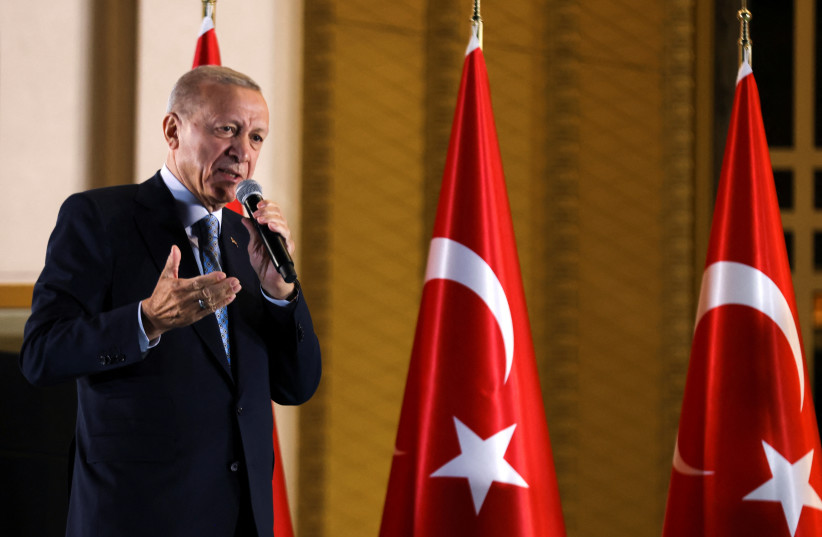Erdogan’s cabinet reshuffle targets Turkey’s foreign relations, economy
Turkey’s new cabinet is a signal to foreign countries that Ankara is hoping for a reset in relations, but it will still be President Recep Tayyip Erdogan who will decide whether there is a change of course in policy, analysts told The Media Line.
The appointments of the new ministers were announced on Saturday, following Erdogan’s victory in the recent Turkish elections and his swearing-in for a third term as president. Almost the entire cabinet was reshuffled, with only two ministers retaining their posts.
Axel Bertamini-Corluyan, an academic based in Washington, DC, said he did not believe there would be major changes in Turkish policies and the new cabinet ministers were a sign of continuity as they had served other high-level roles under Erdogan.
He said that Erdogan’s choice of the respected economist Mehmet Simsek as the new finance minister was meant as a signal to attract foreign investors.
“The appointment of a well-known figure for the Ministry of Treasury and Finance, Mehmet Simsek, is mostly about appearances and the re-establishment of trust and relations with foreign markets and investors,” Bertamini-Corluyan wrote to The Media Line.
 Turkish President Recep Tayyip Erdogan addresses his supporters following his victory in the second round of the presidential election at the Presidential Palace in Ankara, Turkey May 29, 2023. (credit: UMIT BEKTAS/REUTERS)
Turkish President Recep Tayyip Erdogan addresses his supporters following his victory in the second round of the presidential election at the Presidential Palace in Ankara, Turkey May 29, 2023. (credit: UMIT BEKTAS/REUTERS)“Like all other ministers, Simsek was appointed to perform in accordance with Erdogan’s wishes, not to act in an autonomous fashion based on his views.”
“The cabinet selection suggests to me that Erdogan wants a bit of a fresh start, a positive reset.”
Timothy Ash
How does Erdogan hope to use foreign relations to help Turkey’s economy?
Foreign investment has been a key part of Turkey’s economic growth, and in recent years Erdogan has sought warmer relations with other countries to attract funding for Turkey. He found little success with Europe and the US, but Saudi Arabia and the Gulf states have agreed to send billions of dollars.
Turkey’s economy has raised alarm bells around the world, with concerns over its low foreign reserves and the possibility that it could face a banking crisis. The lira has plummeted in value, and although inflation has been steadily declining, it was officially reported at 39.6% in May.
Independent economists accused Turkey of misreporting the actual inflation rate, which they believed passed 180% at one point last year.
Other key appointments to the cabinet are Hakan Fidan, the former head of MIT, the national intelligence organization, as foreign minister, and Erdogan’s spokesman, İbrahim Kalın, to head MIT.
Removed from the cabinet was Süleyman Soylu, the hard-line interior minister who was speculated to be a possible successor to the president and cultivated a high profile for himself.
Kristian Brakel, head of the Turkey office for the Heinrich Böll Foundation, a German think tank, told The Media Line that Soylu had created discord within Erdogan’s Justice and Development Party and ostracized the West.
On the other hand, Erdogan sees Fidan as trustworthy and as recognized in other countries. Fidan is “somebody he can trust, somebody who shares many of his worldviews, is well known abroad, and is not that embroiled in inner party feuds,” Brakel wrote to The Media Line.
Brakel said the types of policy changes Simsek would attempt to introduce were still unknown.
“He will try some changes but not sure how far and long this will last,” Brakel wrote. “There are no easy solutions to the current situation.”
Timothy Ash, an economist focused on Turkey and a strategist at BlueBay Asset Management, told The Media Line that it would be Erdogan’s choice for the next central bank governor that would be central to future policies.
“I think this cabinet is the best we could have expected,” he said. “The cabinet selection suggests to me that Erdogan wants a bit of a fresh start, a positive reset.”
Economists blame Erdogan’s unorthodox policies, such as keeping interest rates low despite skyrocketing inflation, as well as increasing control over financial decisions, for much of the country’s economic woes.
The lira plummeted after he appointed his son-in-law as finance minister in 2018. The economy is seen as one of the key factors in the loss by Erdogan’s party in the 2019 mayoral elections in Istanbul and Ankara.
Erdogan started his political career as the mayor of Istanbul and has talked about taking the city back since his re-election on May 28.





Comments are closed.